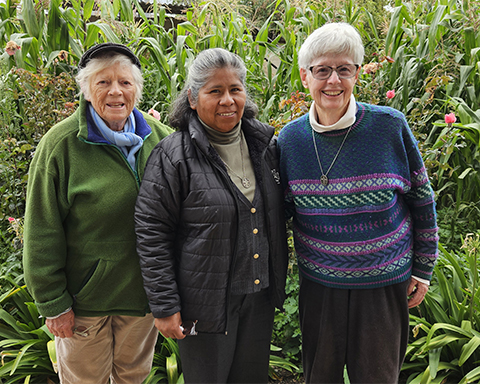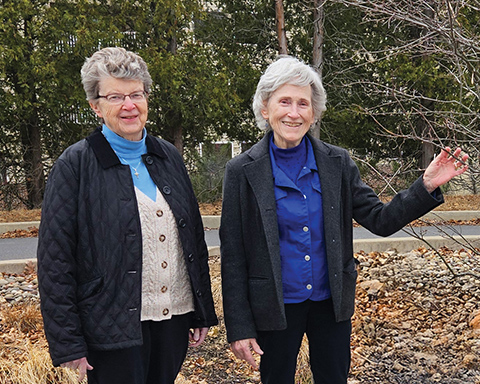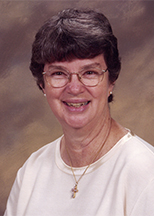Journey
In the Midst of Simple Living
IHM Sisters Norma, Eileen and Ancilla explore living simply in Sicuani, Peru.
by IHM Sisters Norma Poma Arpi, Eileen Egan, and Ancilla Maloney
It seems that one cannot separate the call to live simply from the concept of simplicity. In the volume, Praying with Louise de Marillac, the authors write that “simplicity means that we live close enough to the limits of our resources so that we can rely on God`s providence and appreciate the simplicity of life…. Simplicity is not a simple way to live. It requires serious reflection to sort out what is necessary and what is luxury. With all the pressures to buy this and have that, it is difficult to be satisfied with having just enough to be generous and caring.”
In July of 1986 as a result of the work of Chapter delegates, a Renewal of Vows for our IHM Congregation was written. The Sisters wrote, “By my poverty I choose dependence on God and simplicity of life. I pledge myself to use sparingly the resources of this earth. I will foster an attitude of contentment with what is provided. I will not accumulate things I do not need and I will share what I have—my time, talents, possessions, myself—with my sisters and with those in need.”
Added to these ideas, we are very mindful of our living side-by-side with families who, not by choice, but by the circumstances of their lives, have very little of this world’s resources. We are very mindful that, compared to most of them, we are rich. We have a stove, a refrigerator, hot water, furniture, comfortable spaces around us. We can buy what we need when we need it. We’re fortunate. There are five little food stores in a radius of one or two blocks so we don’t stock up on food. We have donations from friends far and wide which help us respond to the many needs that present themselves at our doors. One of our very long-time neighbors was in the hospital in Cusco, a two and a half hour drive away. His wife needed to be near him as his surgery was serious, but she had no money to stay anywhere in Cusco. And we helped her. A young student of Sister Norma’s tried to commit suicide last week. Norma was by her side in the hospital. The girl was shivering. Without hesitation, Norma gave the young girl her own coat.

Each of us has reflected on her own life choices and experiences of simple living and we recount them here.
Ancilla
Food is basic to daily living. Sometimes I just want a grilled cheese sandwich and some potato chips for supper. BUT, often there is leftover food in the refrigerator. What’s the choice? Most times it’s the leftovers. Our convent is really the parish house and we are available 24-7 to the people who live here. Our doorbell rings in the middle of a meal or prayer or 3 seconds after we sit down to rest at the end of a busy day. I often say a quick prayer to Saint Alphonsus Rodriguez, a doorkeeper at a Jesuit college in Spain. Rodriguez imagined everyone who knocked at the door to be the Lord himself and greeted everyone with the same smile he would have given God. Then, I open the door with a smile.
I’ve been in Peru twelve years and have rarely bought clothes. I have what I need. My uniform for special occasions is blue fleece and black slacks. No other.
None of our neighbors have indoor heating. We don’t either. We have a heater in the community room for the cold months from mid-April until August — if the gas works. Layering of clothing is necessary as on sunny days the temperature rises to T-shirt temperatures. The rooms in the house are all separate. A friend who visited said, “Now I know what living outside is like,” as we have to walk outside to go to another room. When one knows what others do not have, one must make choices. And also, be content with what is provided.
As neighbors make known their needs, I again and again recognize how grateful I am for all the IHM Congregation provides me.
Everything we can recycle we do or use up completely. For instance, we give our food scraps to feed the chickens and guinea pigs Sister Norma’s mother raises. We compost food scraps. We burn paper or recycle it. We separate other garbage and each morning a woman bangs on a piece of metal to let us know that her bicycle propelled garbage cart is passing by. Poor women here collect the garbage beginning very early every morning. In return they receive a free meal for their children.
We have a car, but most of the time we don’t use it. We step out the front door and within 5 minutes a van, called a “combi,” comes by and for a sole (less than 35 cents), takes us downtown where everything we might need is within walking distance. Or we can take a moto, a bicycle with a battery and a cab attached that takes us where we need to go for three soles or one dollar. We can take a bus to Cusco for 11 soles or less than 4 dollars.
And then there is the beauty of creation surrounding us. Mountains in every direction with streams and fields and animals. Nature is at our doorstep and in our mind`s eye in just a glance.
Eileen
Having grown up on a farm, I carry a few traditions in my long-term memory that help to see me through the challenges of living in the South Andes of Peru. For example, during my childhood when the pipes coming from the well froze during the winter, my Mom made sure that the dishes were scraped before placing them in the dishwater—one pan for washing, the other for rinsing. Then that water was used to mop the floor and what was left over was used to flush the toilet. On occasion our water is shut off in Sicuani, especially during planting season to irrigate the crops. Because of global warming the traditional rainy season is now intermittent. Thus, “The Egan water routine” comes into play in our home. We’ve also become accustomed to storing water in a covered garbage can for fear of the water stoppage.
Since I still have roots in the USA, every year my suitcase carries three items that are unavailable on our mission: cranberry sauce for Thanksgiving and Christmas, canned pumpkin pie mix and some packages of Good Season’s Salad Dressing. I always wished that the weight wouldn`t prohibit my bringing some cans of tomato soup until I had some in a restaurant in Cusco and asked the cook for the recipe. During the week we eat the same food as the girls in the IHM House of Studies which includes meat twice a week… mostly lamb since each needs to contribute a lamb as part of her room and board.
Other than that, our menu includes lentils, beans, squash stew with cheese or rice and eggs. On weekends we cook more traditional food like chicken, meatloaf or barbecue.
One time, my friend, Sister Margaret Burke, came down to Peru to help out. She commented that we waste too much time washing our clothes by hand, so, returning to the States she organized a collection at the First Friday Mass in Holy Rosary School to get us a washing machine. Up to this day we call it the “Holy Rosary washing machine.” Currently, a solar hot water tank is being installed on our roof to help reduce the electric bill.
St. John of the Cross in his Spiritual Canticles seems to sum up the simple life with these words:
My beloved is in the mountains
And the lonely wooded valleys
Strange islands
And resounding rivers
The whistling of love stirring breezes
The tranquil night
At the time of the rising dawn
Silent music
Sounding solitude
The supper that refreshes and deepens love.
Norma
To live simply is a challenge. How can one live simply? It seems to me that to live simply is not to become enslaved by things, but to live as Jesus taught. In our materialistic culture, this is difficult, but not impossible. Many times, we are enslaved by the clock, by technology, by the latest styles, or by ads for the newest box of fast food. God has created us out of love, filled us with gifts and talents and placed us in this world to cultivate it. However, we humans, seeking happiness, mistake it for material comforts and pleasures. Unfortunately, we become prisoners of things and gadgets. We become addicted to our cell phones and oblivious to the people beside us.
For me, to live simply is to live as Jesus taught, loving my neighbor, pardoning those who offend me, living the beatitudes and acknowledging with humility that I am a weak human being who could also become addicted to material things. But having Jesus as my example, I can strive to follow Him in spite of my weakness, and say with His Mother Mary, “Be it done unto me according to Your Word.”
By our vow of evangelical poverty as written in our 2024 approved IHM Constitutions, we read and ponder our commitment in the following passages:
“We witness to our vow of evangelical poverty through a simple lifestyle, making choices based on need rather than desires.“ Further, “Our primary motivation is the following of Jesus Christ in his total giving of Himself to the Father for the salvation and liberation of humankind.” Evangelical poverty also commits us to: “the dedication of time, labor, resources, and talents for the benefit of others, especially the marginalized.”
Years ago, Sister Elaine Prevallet, SL, wrote “Reflections on Simplicity” in a Pendle Hill Pamphlet 244, which we strongly recommend. She pointed out that the spirit of simplicity requires an uncluttered and unclinging spirit. If as the Quaker, Thomas Kelly suggests, we take the matter into that Center where God`s direction is available, we can be sure that we will be guided – sometimes in painful ways we might not have chosen – in the process of letting ourselves be made simple.
The old Shaker song reminds us: “Tis a gift to be simple, a gift to be free. Tis the gift to come down where we ought to be.”
As followers of Jesus, it`s where we ought to be.
References
Gibson, Audrey and Kieran Kneaves, Companions for the Journey: Praying with Louise de Marillac. St. Mary`s Press, 702 Terrace Heights, Winona, MN
1986 IHM Chapter Renewal of Vow Formula
2024 IHM Constitutions
Elaine M. Prevallet, Reflections on Simplicity. Pendle Hill Pamphlet 244, Pendle Hill Publications, Wallingford, Pennsylvania, 1982. p. 23



